Research
Research
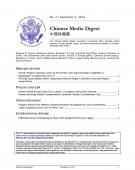
Highlights of this edition: Former People’s Liberation Army Air Force Pilot Cites Improved Radar Capabilities in Dismissing F-22 Superiority over J-11; PLA Daily Lauds Disaster Relief Cooperation between People’s Liberation Army and People’s Armed Police; Phoenix Weekly Reveals Scale of Xu Caihou’s Corruption Only to Be Censored; Female University Student Compensated in Landmark Gender Discrimination Case; Progress Report from Ministry of Finance Proposes No Bailouts for Local Governments; China’s Response to the “Low Oil Price” Era; Difficulties Persist in Resuming Six-Party Talks despite North Korea’s Signal
Research
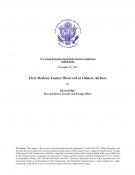
This report examines the context and implications of satellite imagery of an IL-78/MIDAS air refueling tanker at a Chinese military airbase.
Research
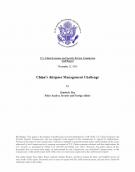
As the number of civil aviation users increases and the aviation industry continues to mature in China, Beijing seeks to strike a balance between liberalizing its airspace to respond to growing commercial demands and retaining a strict military hold on airspace for the purpose of national security. This report explores China's efforts to reform air traffic control and airspace management, as well as challenges China may face as it seeks further reform.
Research
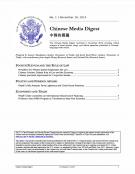
Highlights of this edition: President Xi’s Plenum Speech Emphasizes the Law; Chinese Scholars Debate Rule of Law and the Economy; Chinese Journalist Imprisoned for Corporate Slander; People’s Daily Analyzes Party Legitimacy and China-Russia Relations; People’s Daily Comments on International Infrastructure Financing; Professor Sees EMBA Program as Tarnished by State-Run Economy
Research
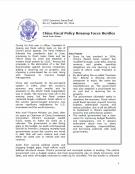
Key Points:
Since its last overhaul in 1994, China’s flawed fiscal system has muddled through. Local debt, slowing revenue, and greater spending obligations are now spurring a new round of reform under President Xi Jinping;
By eliminating the so-called “business tax,” Beijing is allowing services companies to enjoy the same tax deductions and rebates manufacturers do. The government may also establish a price-based tax on coal and a recurring tax on property;
The government ultimately seeks to rebalance the economy. Fiscal reform could boost services, prevent housing bubbles, redistribute income, and reduce pollution. But it will be difficult to implement in China’s segmented economy and authoritarian system;
The central government has a clear vision for improving budget flexibility and transparency. Yet it remains ambivalent about how to share revenue, spending responsibilities, and borrowing authority with local governments.
